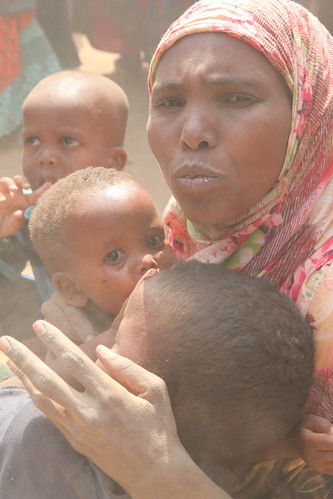In the 1980s, towards the end of the Cold War, Somalia was heavily dependent on food aid. After the Soviet Union stopped supporting the dictator Siad Barre, the United States saw their chance. The US and other Western countries planned to make Somalia a hub to increase their influence into the Indian Ocean; in particular, they tried to buy influence through food aid.
 |
| UK Secretary of State for Development, Andrew Mitchell, in Dadaab refugee camp in Kenya CC BY DFID |
Until today, it has been difficult for common people in Somalia to access healthy, nutritious food. The country remains ruled by various clans and torn apart by civil war. What is new in the current crisis is that climate change has aggravated the situation. It means that consumption behavior and mobility preferences in industrial states are now directly related to food insecurity in developing countries.
 |
| A mother with her children in Dadaab refugee camp CC BY Oxfam |
Our immediate humanitarian impulse should be to wire the equivalent of a night out in the pubs to the donor agency of your choice – please see the buttons – to provide food to the starving population of Somalia (plus Ethiopia, Kenya and Uganda). But in the long term we have to urgently stop climate change. This year will hopefully see commitments to significantly reduce emissions at the COP17 Conference in Durban. The EU and China are progressing in emission reductions (the EU rather cautiously, China at an impressive pace), while the US has relegated climate change mitigation to the back row.
 |
| Farm animals in Somaliland died from undernutrition - CC BY-NC-ND Oxfam |
It is time that the highest polluters per capita (2008) such as Qatar, Trinidad & Tobago and the United Arab Emirates, but also the US, Canada, Australia and several EU countries, realize the urgent necessity of fighting climate change. Otherwise, climate refugees may come and occupy their farmlands.
Update 08/08/2011: See the Guardian's take here: Is climate change to blame for famine in the Horn of Africa?
This blogpost is part of the 48 Hours of Action against the famine in the Horn of Africa. It currently has a value of five working hours and 40 EUR of donations. Please let me know via the contact form if it influenced you to donate; I will adapt the figures.